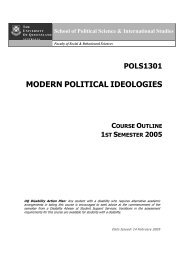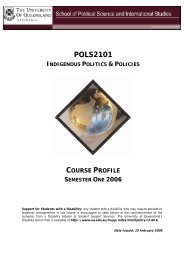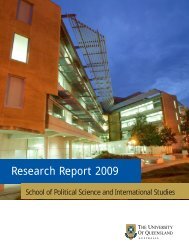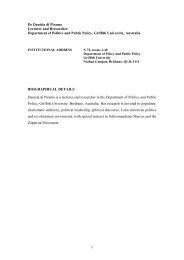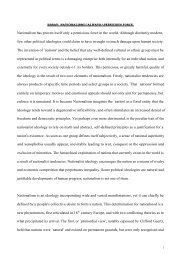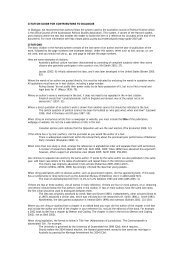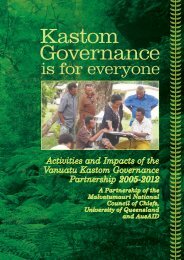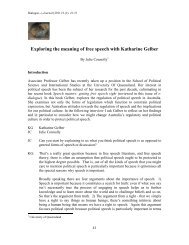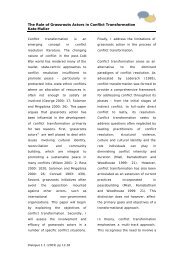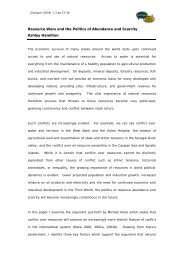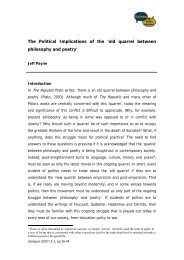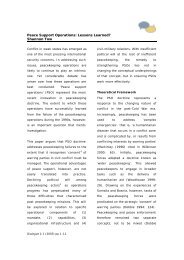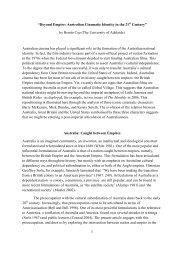POLS1301 - School of Political Science and International Studies ...
POLS1301 - School of Political Science and International Studies ...
POLS1301 - School of Political Science and International Studies ...
Create successful ePaper yourself
Turn your PDF publications into a flip-book with our unique Google optimized e-Paper software.
PLAGIARISM & ADVICE FOR STUDENTS WRITING ESSAYS<br />
Students are advised to thoroughly acquaint themselves with the University’s policy concerning<br />
plagiarism as outlined in the <strong>School</strong> <strong>of</strong> <strong>Political</strong> <strong>Science</strong> <strong>and</strong> <strong>International</strong> <strong>Studies</strong> Essay Guide 2006.<br />
The guide can be obtained from the <strong>School</strong>’s Enquiries Office (Level 5, Building 39A) or downloaded<br />
from the H<strong>and</strong>books section <strong>of</strong> the <strong>School</strong>’s website (http://www.uq.edu.au/polsis).<br />
It is the University’s task to encourage ethical scholarship <strong>and</strong> to inform students <strong>and</strong> staff about the<br />
institutional st<strong>and</strong>ards <strong>of</strong> academic behaviour expected <strong>of</strong> them in learning, teaching <strong>and</strong> research.<br />
Students have a responsibility to maintain the highest st<strong>and</strong>ards <strong>of</strong> academic integrity in their work.<br />
Students must not cheat in examinations or other forms <strong>of</strong> assessment <strong>and</strong> must ensure that they do<br />
not plagiarise.<br />
The University has adopted the following definition <strong>of</strong> plagiarism:<br />
Plagiarism is the act <strong>of</strong> misrepresenting as one’s own original work, the ideas, interpretations,<br />
words or creative works <strong>of</strong> another. These include published <strong>and</strong> unpublished documents,<br />
designs, music, sounds, images, photographs, computer codes <strong>and</strong> ideas gained through<br />
working in a group. These ideas, interpretations, words or works may be found in print <strong>and</strong>/or<br />
electronic media.<br />
The following are examples <strong>of</strong> plagiarism where appropriate acknowledgement or referencing <strong>of</strong> the<br />
author or source does not occur:<br />
• Direct copying <strong>of</strong> paragraphs, sentences, a single sentence or significant parts <strong>of</strong> a sentence;<br />
• Direct copying <strong>of</strong> paragraphs, sentences, a single sentence or significant parts <strong>of</strong> a sentence<br />
with an end reference but without quotation marks around the copied text;<br />
• Copying ideas, concepts, research results, computer codes, statistical tables, designs, images,<br />
sounds or text or any combination <strong>of</strong> these;<br />
• Paraphrasing, summarising or simply rearranging another person’s words, ideas, etc without<br />
changing the basic structure <strong>and</strong>/or meaning <strong>of</strong> the text;<br />
• Offering an idea or interpretation that is not one’s own without identifying whose idea or<br />
interpretation it is;<br />
• A ‘cut <strong>and</strong> paste’ <strong>of</strong> statements from multiple sources;<br />
• Presenting as independent, work done in collaboration with others;<br />
• Copying or adapting another student’s original work into a submitted assessment item.<br />
The <strong>School</strong> takes the issue <strong>of</strong> plagiarism very seriously, <strong>and</strong> all incidents <strong>of</strong> suspected plagiarism<br />
will be referred to the Head <strong>of</strong> <strong>School</strong>. The Head <strong>of</strong> <strong>School</strong>, in consultation with the staff<br />
member, will determine if the plagiarism has resulted from poor academic practice or was intentional.<br />
• Unintentional plagiarism, such as cavalier or inadequate referencing or failure to reference, will<br />
be considered “poor academic practice” <strong>and</strong> a demonstration <strong>of</strong> carelessness in research <strong>and</strong><br />
presentation <strong>of</strong> evidence. In these cases, you may lose marks for that part <strong>of</strong> the assessment<br />
that has been plagiarised <strong>and</strong>/or you may be required to correct the error.<br />
• Intentional plagiarism will be treated as misconduct. The Head <strong>of</strong> <strong>School</strong> will proceed in<br />
accordance with HUPP 3.60.1 – Procedures for dealing with Student Discipline <strong>and</strong> Misconduct.<br />
You are encouraged to read the UQ Academic Integrity <strong>and</strong> Plagiarism policy, available at<br />
http://www.uq.edu.au/hupp/index.html?page=25128, which makes a comprehensive<br />
statement about the University’s approach to plagiarism, the consequences <strong>and</strong> the principles<br />
associated with preventing plagiarism.<br />
<strong>POLS1301</strong> Modern <strong>Political</strong> Ideologies<br />
Course Pr<strong>of</strong>ile<br />
Semester One - 2006 Page # 13



